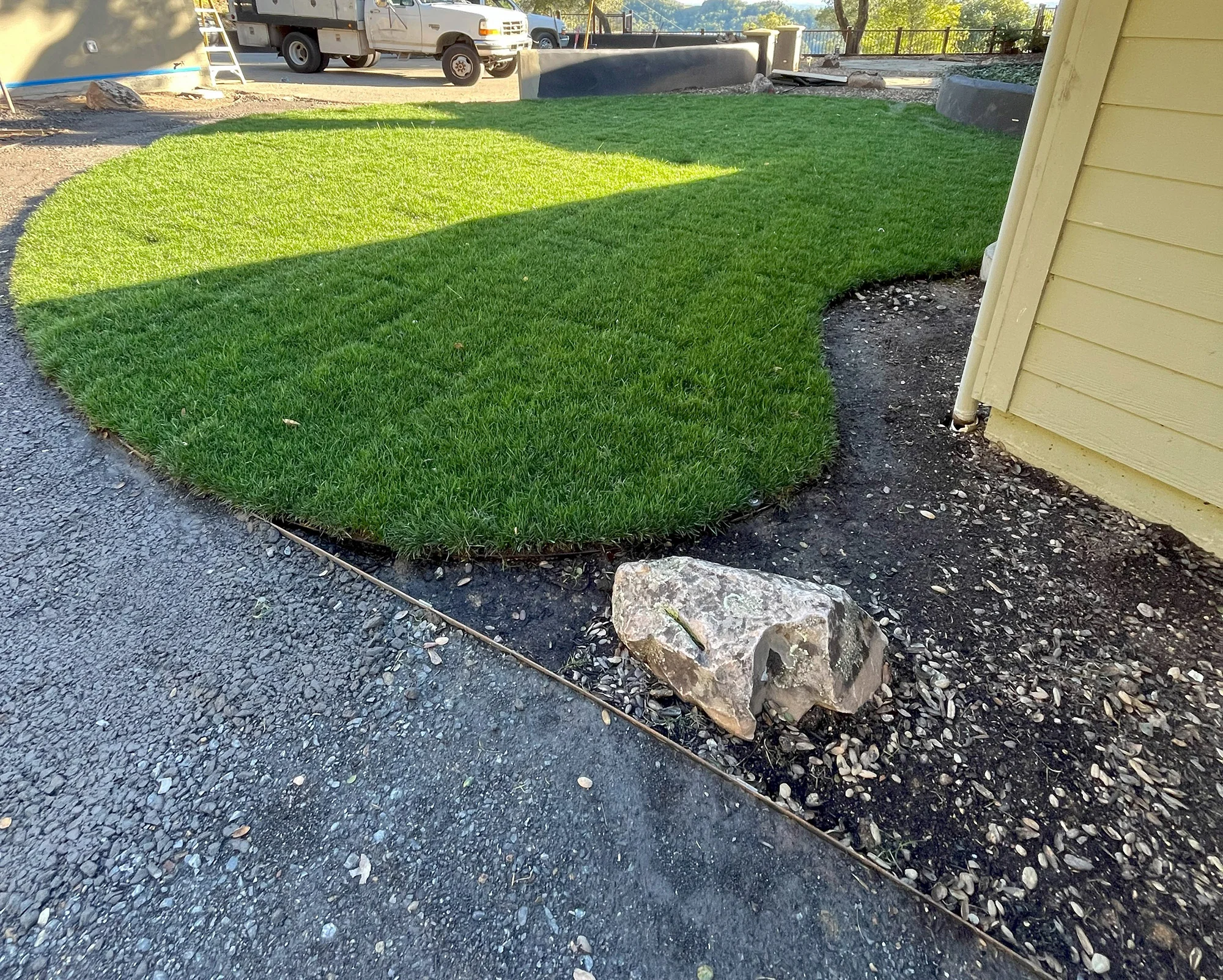
6 Ways to Conserve Water in Your Landscape
- Date:16 Aug, 2022
- By:Matthew Ripley
- Category:Landscape Irrigation
As California experiences extreme levels of drought, homeowners are searching for new ways to reduce their water consumption. Especially here in sunny Sonoma County, many homeowners use tens of thousands of gallons of water for their landscape each year. As responsible homeowners, you may be asking, is there a way you can both have a beautiful yard, while also conserving water?
Our team of professionals at Inspired Landscapes have spent years in Sonoma County landscapes, and with their experience and expertise, their team of knows what it takes to sustainably maintain a beautiful garden and reduce your water bill. Here are some tips from our experts to help you begin to save water on your landscape.
Upgrade Your Irrigation System
Traditional, inefficient irrigation systems waste a lot of water in landscapes. If you are still using a spray irrigation system or non-weather-based controller, now is the right time to upgrade. Improving efficiency in your irrigation system is a simple as;
- Complete an irrigation system start up inspection each spring: Before turning on your irrigation system in the spring complete a top to bottom irrigation audit to check for leaks, sprinklers pointed in the wrong area, clogged emitters, and proper operation from the irrigation controller. A thorough top to bottom inspection is critical to ensure you aren’t wasting water over the coming months.
- Update your system with a smart controller: A smart weather-based or Wi-Fi-enabled controller uses sensors or communicates with local weather stations to determine how often and for what duration to run the irrigation stations. It can improve the watering efficiency of your irrigation system by 40% or more.
- Add weather sensors: A weather sensor tells your irrigation system to adjust according to the temperature or due to recent rains. When the weather is cool or it had recently rained, it instructs your irrigation system to release less water than usual, so you do not overwater your plants or use unnecessary water.
- Upgrade to water-efficient emitters: As emitters age, they become less efficient. Old or malfunctioning emitters utilizing dated technology can waste hundreds of gallons of water in the landscape every year. If your sprinkler heads, drip irrigation emitters, or rotors are 5+ years old, replace them with water-efficient alternatives
- Install a flow meter: Tracking water use over a period of time with a flow meter allows you to understand exaction how much water each irrigation zone should use. If you notice abnormally high use, you can be certain you have a leak, which often isn’t noticeable just from a visual inspection. Flow meters can be connected to smart controllers to send alerts via text or email when abnormally high water use is detected.
Maintain Your Irrigation System
No matter how advanced your irrigation system is, it needs ongoing care and maintenance. Regular maintenance helps improve the efficiency of your irrigation system and can prevent problems before they occur.
Visually inspect your irrigation system once a month by turning on the stations and walking the irrigation zones. Fix any leaks immediately. Remember, even a minor leak can contribute largely to unnecessary water usage.
Make sure sprinkler heads aren’t clogged with dirt and dust. Remember to regularly check the water pressure and adjust accordingly. To get rid of dust and debris, flush your irrigation system at the start of the season.
Plant Native and Drought-tolerant Plants
Plants which are native to our region are adapted to our long, hot, and dry summers so they need less water than exotic species and are also more resilient to region-specific diseases and infections. In addition, native plants are great for providing food and habitat for pollinators, birds, and other small animals, supporting their local ecosystem.
Based on the location of your property, a landscape and irrigation technician can help you determine the right species of native plants for your garden.
Install a Rain Barrel
Rain water is good for your plants and soil as it is devoid of many of the salts and chemicals found in groundwater and city water sources. To store rainwater, use a rain barrel.
There is a hole in the lid of a rain barrel, covered with a fine mesh screen. This allows water to flow inside the barrel, while preventing insects, including mosquitoes, and dirt from getting in.
Elevate the rain barrel on blocks so users can fill their watering cans with ease. Your landscaping contractor can help you figure out the best way to integrate a rain barrel with your irrigation system. Alternatively, incorporate a greywater system into your irrigation system to recycle greywater produced by your household.
Mulch
There are several benefits of mulch. It improves soil moisture and reduces the amount of water that evaporates from your landscape. Weeds compete with plants for sunlight, water, and other nutrients therefore a thick layer of mulch can be an effective weed suppressant. It also moderates soil temperature, which contributes to root growth. Apply a 2-3-inch-deep layer of organic mulch such as wood chips, compost, or shredded bark to your planting beds.
Adopt Best Watering Practices
To reduce the rate of evaporation and prevent fungal diseases and sunscald, water the soil and not the leaves. Try to water your plants with drip irrigation rather than overhead spray in the nighttime or early morning when temperatures are low, and evaporation is minimal.
Too much water is just as harmful to plants as too little water in fact most plants in landscapes die from overwatering rather than underwatering! Using a watering system that efficiently delivers the correct amount of water for your plants at the proper time and in the correct location for the root zones to absorb it is essential.
Whether you want to build a new landscape from scratch, or maintain an existing one, Inspired Landscapes can help. Our team of experts specialize in irrigation and water management to ensure a sustainable and beautiful yard. To learn more or book a free consultation, call (707) 395-7474.

Owner, Inspired Landscapes LLC
Matthew Ripley is the owner of Inspired Landscapes LLC, a Healdsburg based landscape design, installation, maintenance, and irrigation firm serving Sonoma County. His work blends horticultural expertise with sustainable practices, drawing creative influence from Sierra backpacking and Sonoma winery estates to craft gardens that invite wildlife and year round color. Client testimonials highlight his design leadership on residential, estate, and winery properties across the region.





